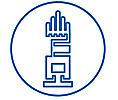
Résumé
Superconducting magnets are typically maintained in a cryogenic environment to sustain their superconducting state. The use of cryocoolers for conductive cooling of these magnets has emerged as a cost-effective and operationally simple cooling trend. However, achieving an efficient heat connection between cryocoolers and low-temperature superconducting magnets has become a key concern. Vibrations and electromagnetic interference from the cold head can impact magnet performance, while the leakage field from high-field magnets can affect cryocooler efficiency. Furthermore, the integration of coolers and cooled objects necessitates efficient heat transfer units for long-distance heat conduction. Pulsating heat pipes have shown remarkable advantages in this aspect.
This study aims to experimentally investigate the heat transfer characteristics of long-distance liquid helium pulsating heat pipes. Specifically, it seeks to explore the relationship between the effective heat transfer coefficient of these heat pipes and the length of heat transfer while providing theoretical explanations.
Documents disponibles
Format PDF
Pages : 8
Disponible
Prix public
20 €
Prix membre*
Gratuit
* meilleur tarif applicable selon le type d'adhésion (voir le détail des avantages des adhésions individuelles et collectives)
Détails
- Titre original : Experimental study on long-distance helium pulsating heat pipes.
- Identifiant de la fiche : 30032635
- Langues : Anglais
- Sujet : Technologie
- Source : 10th IIR Conference on Caloric Cooling and Applications of Caloric Materials
- Date d'édition : 24/08/2024
- DOI : http://dx.doi.org/10.18462/iir.thermag.2024.0027
Liens
Voir d'autres communications du même compte rendu (29)
Voir le compte rendu de la conférence
-
Theoretical and experimental simulation for det...
- Auteurs : DUARTE J. A.
- Date : 16/07/2012
- Langues : Anglais
- Source : 2012 Purdue Conferences. 14th International Refrigeration and Air-Conditioning Conference at Purdue.
- Formats : PDF
Voir la fiche
-
Experimental study of R245fa during flow boilin...
- Auteurs : CHARNAY R., REVELLIN R., BONJOUR J.
- Date : 25/10/2012
- Langues : Anglais
- Source : RCR 2012. 3rd IIR Workshop on Refrigerant Charge Reduction in Refrigerating Systems: Valencia, Spain, October 25-26, 2012.
- Formats : PDF
Voir la fiche
-
HFC32 vaporisation inside a brazed plate heat e...
- Auteurs : LONGO G. A., MANCIN S., RIGHETTI G., et al.
- Date : 16/08/2015
- Langues : Anglais
- Source : Proceedings of the 24th IIR International Congress of Refrigeration: Yokohama, Japan, August 16-22, 2015.
- Formats : PDF
Voir la fiche
-
Characterisation of a plate heat exchanger work...
- Auteurs : GARCÍA-CASCALES J. R., VILLALBA-REGUERA J., ILLÁN GÓMEZ F., VELASCO F. J. S., OTON MARTINEZ R. A., DELGADO-MARÍN J. P.
- Date : 26/06/2024
- Langues : Anglais
- Source : 12th CYTEF Congress - Ibero-American Congress of Refrigeration Science and Technology.
- Formats : PDF
Voir la fiche
-
Experimental and simulation analysis for heat t...
- Auteurs : FARRAJ A. R., HRNJAK P.
- Date : 2022
- Langues : Anglais
- Source : 2022 Purdue Conferences. 19th International Refrigeration and Air-Conditioning Conference at Purdue.
- Formats : PDF
Voir la fiche
